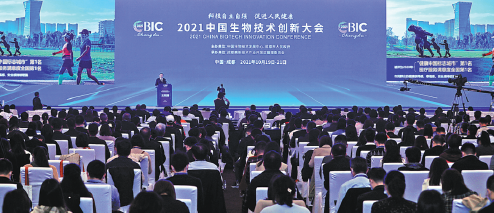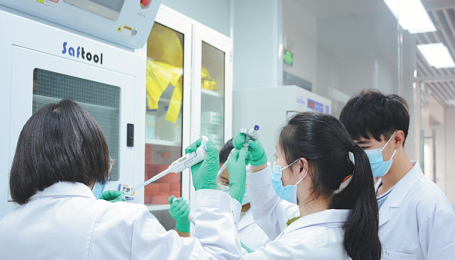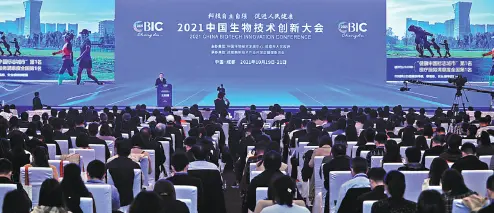Chengdu Hi-Tech Industrial Development Zone, or the CDHT, in Southwest China's Sichuan province is gaining momentum in technological innovation as more high-tech enterprises settle there.
The 2021 China Biotech Innovation Conference was held on Oct 19-21 in the CDHT, attracting nearly 30 academicians, more than 300 professionals and 1,000 scholars, as well as more than 50 well-known pharmaceutical companies from home and abroad and nearly 20 among the world's top 500 companies in the sector.
Holding the conference is of far-reaching significance to the development of biotechnological innovation in Chengdu, helping improve the national and global influence of the city's biotech industry, according to local officials.
A raft of leading biomedical enterprises in Chengdu participated, among which was WestVac Biopharma Co headquartered in the CDHT.
The company specializes in vaccine development, production and immunotherapy. It has a core research team led by Wei Yuquan, an academician of the Chinese Academy of Sciences and director of the national-level laboratory of biotherapy at Sichuan University's West China Hospital.
The CDHT has achieved remarkable results in the construction of an industrial area led by the biopharmaceutical industry ecosystem. It provides strong support and confidence for the development of enterprises, according to Wei.
Within seven months after its establishment in July 2020, the company became a unicorn enterprise with a valuation of more than 6 billion yuan ($937.7 million).
Qitan Tech is another high-tech company that has achieved growth in the CDHT. Specializing in gene sequencing, the company was set up in 2016 and has developed into China's first nanopore single-molecule gene sequencer. It fills a gap in the field of new-generation gene sequencing technology in the country, according to the company.
"The nanopore sequencing technology has diversified and imaginative applications," said Xie Dan, co-founder of Qitan Tech.
In the field of pathogen research, it can help researchers better understand genetic information. In response to public health emergencies, the technology can break through previous technologies' dependence on laboratories, allowing inspectors to go to the front line and find the source of outbreaks in a shorter time, according to Xie.
As a technology-driven enterprise, Qitan Tech has established a world-class interdisciplinary research and development team. The company has more than 200 staff members from academic disciplines including protein, chips, circuits, software and algorithm, 75 percent of whom are responsible for the company's R&D.
To date, the company has applied for nearly 40 patents and copyrights at home and abroad.
"In the field of biomedicine, Chengdu's excellent industrial support facilities and ecosystem are obvious to all," Xie said.
The CDHT pays attention to the cultivation of innovative tech companies, with special policies on resources, capital and infrastructure introduced to help startups focusing on R&D, Xie added.
The nanopore gene sequencer developed by Qitan is a cutting-edge technology with high interdisciplinary integration, which requires the participation of high-level professionals with multidisciplinary backgrounds.
Chengdu is home to some first-class universities in the fields of biomedicine and electronic information, such as Sichuan University and the University of Electronic Science and Technology of China. They provide a high-quality scientific research atmosphere and talent reserve, according to Xie.
In April, Qitan's first production base in good manufacturing practices, or GMP standards, was launched in Chengdu Tianfu International Biological City. It is planned to be completed and put into operation this year.
Chengdu Tianfu International Biological City, established by the CDHT and the city's Shuangliu district, is a major area of Chengdu's biomedical industry, and is becoming fertile ground for the growth of biomedical enterprises.
Over the past five years, 150 projects have settled there, with a total investment value exceeding 110 billion yuan.
In late September, the CDHT released a list of high-tech enterprises supported by preferential policies. More than 2,000 enterprises are being supported by funds exceeding 500 million yuan.
As the first national independent innovation demonstration zone in western China, the CDHT, adhering to the innovation-driven development strategy, is stepping up its efforts to gather innovative elements. They include professionals, intellectual property, business incubation, and scientific and technological finance, according to local officials.
Since the application of preferential policies on scientific and technological innovation, industrial cultivation and professional introduction, enterprises have experienced rapid growth in the CDHT, according to a senior zone official.
Looking ahead, the CDHT will accelerate the development of platforms to help boost scientific and technological innovation, improve the innovation system, and help create high-quality driving forces for local economic development, the senior official added.

The 2021 China Biotech Innovation Conference is held from Oct 19-21 in Chengdu Hi-Tech Industrial Development Zone, or the CDHT, in Sichuan province. CHINA DAILY

Staff members at a biotech company based in the CDHT work at a laboratory. CHINA DAILY

Chengdu Tianfu International Biological City, established by the CDHT and the city's Shuangliu district, is a major area of Chengdu's biomedical industry. CHINA DAILY
(APD)
 简体中文
简体中文

